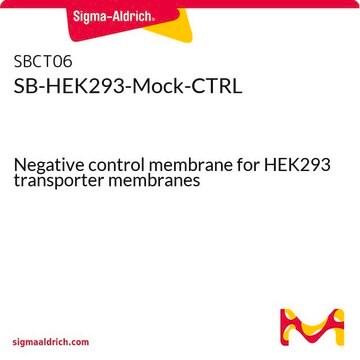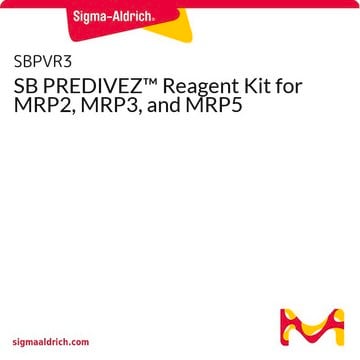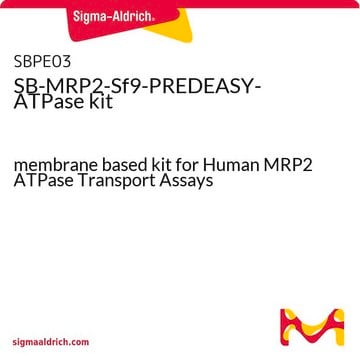SBVT08
SB-MRP5-HEK293
MRP5 human membrane vesicles
Synonym(s):
ABCC5, MRP5, Multidrug resistance associated protein 5
About This Item
Recommended Products
recombinant
expressed in HEK 293 cells
form
liquid
concentration
5 mg/mL
color
off-white
UniProt accession no.
shipped in
dry ice
storage temp.
−70°C
Gene Information
human ... ABCC5(10057)
General description
Application
The standard vesicular transport assay is an inhibitory assay performed with cold test articles. This assay provides information on any interaction between the ABC transporter and the test article. The transport of the reporter substrate is measured in the presence of the test article (typically in 7 concentrations) and IC50 is defined as the concentration inhibiting the transport of the reporter substrate by 50%.
Should radiolabeled form of the investigated compound or adequate analytical methods (LC/MS, HPLC) be available, the vesicular transport assay may be performed in a direct format without the reporter substrate and may identify substrate nature of the test article. The vesicular transport substrate assay is a low throughput assay. It is suitable for low permeability test compounds as high permeability compounds may escape from the vesicles through the lipid bilayer.
PREDIVEZ vesicular transport kit is sold separately. This transporter membrane vesicle assay requires the PREDIVEZ vesicular transport kit and corresponding control membrane below:
SB PREDIVEZ Reagent Kit for MRP2, MRP3, and MRP5 part number SBPVR3-9RXN and corresponding control membrane SB-HEK293-Mock-CTRL part number SBCT06-1EA
Physical form
Legal Information
related product
Storage Class Code
10 - Combustible liquids
WGK
WGK 2
Flash Point(F)
Not applicable
Flash Point(C)
Not applicable
Regulatory Listings
Regulatory Listings are mainly provided for chemical products. Only limited information can be provided here for non-chemical products. No entry means none of the components are listed. It is the user’s obligation to ensure the safe and legal use of the product.
JAN Code
SBVT08-1EA:
Certificates of Analysis (COA)
Search for Certificates of Analysis (COA) by entering the products Lot/Batch Number. Lot and Batch Numbers can be found on a product’s label following the words ‘Lot’ or ‘Batch’.
Already Own This Product?
Find documentation for the products that you have recently purchased in the Document Library.
Our team of scientists has experience in all areas of research including Life Science, Material Science, Chemical Synthesis, Chromatography, Analytical and many others.
Contact Technical Service







